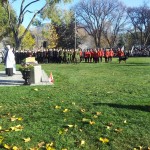Originally published as a column in the AM News on Friday, November 7, 2014.
 In the last few days there has been much turmoil about many issues: environmental, social and political. A new report on climate change was issued by the Intergovernmental Panel on Climate Change (IPCC) just a few days ago and it warns of irreversible damages.
In the last few days there has been much turmoil about many issues: environmental, social and political. A new report on climate change was issued by the Intergovernmental Panel on Climate Change (IPCC) just a few days ago and it warns of irreversible damages.
In the realm of political and social issues, aside from voting that is, we moved on from the killing of the two soldiers and into examining the reasons behind the killings. Answers will elude us for a while, but one can hope that they will be found eventually and our society will be that much better for it. As you know, mental health has been at the centre of the discussions regarding the two crimes. Just like debates on whether adopting new anti-terrorist laws is the way to go.
It is both good and bad when too many topics are pushing to be discussed first. Good because issues will be noticed if written about, one can hope, and ideally solutions will be found down the road, and bad because you don’t want to wrong anyone by not picking their problem first.
Yet no matter though how pressing other issues are at the moment, and they are, today it is our veterans’ turn. Again, because it is November and the commemorative poppies are everywhere. Pin one to your jacket and be grateful for what many did and do for our country.
Again, because not much has been addressed since the writing of the last column discussing veterans, and we find ourselves stumbling upon news of another soldier’s suicide, or someone’s struggle with PTSD and thus unable to lead a normal life, or lack of proper financial support for veterans, fallen or living, and their families.
According to statistics from the Department of National Defense, there are more Canadian Armed Forces suicides than combats deaths during the Afghanistan war (2002 to 2014), 178 versus 158. Moreover, some retired veterans commit suicide after they leave the army, and numbers could be fluctuating even more than already expected.
The main issue rising its ugly head again and again, is mental health. People have argued veterans need to reach out in order to get help. It’s not that simple. Often times, the very thing a veteran is struggling with, prevents him or her from reaching out. Mental issues are never straightforward and easy to address, especially by the people who are affected.
Appearing vulnerable is possibly the last thing a veteran would be ready to commit to. It is not only past events that haunt veterans and can cause trouble, but readjusting to civilian life after coming back from a war zone. Often the effects linger for years and they can do so quietly, until triggered by various circumstances.
Reaching out to other veterans is one of the most helpful piece of advice. The common denominators may not be identical, but they are there.
A national organization that was founded in 2006 called Wounded Warriors Canada (www.woundedwarriors.ca) has a motto that says it all “Honour the Fallen, Help the Living”. So we should.
Through many services, including dog companionship and horse-based non-verbal communication programs, as well as addressing homelessness, transition processes and more, the organization helps veterans and their families, and the funds provided by donations keep increasing, allowing them to reach further and better.
Most of all, their message should be the one every veteran needs to hear: people care. Which is, perhaps, what every one of us wants to hear when struggling. More so, that is what we need to revisit often enough as a society, out of respect for human life, if we want issues like mental health, harassment, financial aid for those in need, and more, to be seen for what they are, and to be addressed accordingly.
For now, take the time to say “Thank you” to all those whose sacrifice of life or quality of life upon returning from a war, have made our lives easier and safer, including the two recently killed soldiers, Warrant Officer Patrice Vincent and Cpl. Nathan Cirillo, and those who still stand on guard for all of us and for our country. Join me in hoping that in the years to come no dire statistics will shadow Remembrance Day.
As with any demographic, veterans or not, one death is too much and it is, in all fairness, our failure, as a society, to save a life.
